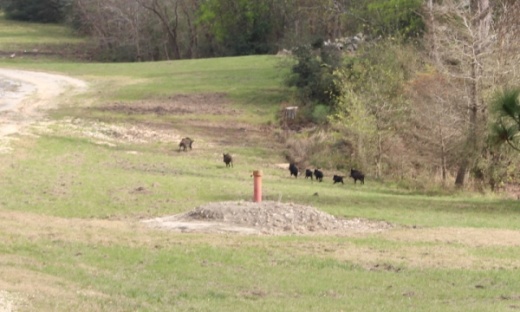The issue of feral hogs was raised at a Jan. 23 City Council meeting, where several residents pleaded with council officials to allow them to continue using electric fences to protect their property from feral hog damage. Residential electric fences are prohibited in the city, officials said.
Lynn Nelson, a resident of Hill Crest Drive in Conroe, said feral hogs have destroyed her neighborhood’s lawns and yards.
“Two years ago, they came into my yard, and I ended up buying 50 bags of top soil and spending hours putting it back,” she said. “I could not get it back up to the height it was. It looked like somebody had come in and plowed my yard.”
Nelson said she installed a small electric fence to keep them at bay, but recently she received a citation from the city.
“I know there’s not a lot you can do about [the hogs], but this is one of the few things we can do. I would like to be able to keep my fence,” she said.
Suzanne and Mike Dunsmore, Nelson's neighbors, said they also recently received a citation for their electric fence, which they installed in 2017. But the fence is their only protection from the hogs, they said.
“We researched and tried a number of options to defend ourselves from the destruction and danger that didn’t work,” Suzanne said. “[The fence] has repelled them ever since. We see their footprints come up to the fence and stop.”
Conroe Director of Community Development Nancy Mikeska said the city ordinance prohibits electric fences due to safety issues.
“To have fences willy-nilly in electric format, it can be dangerous,” she said. “So that’s why it’s always been prohibited. It’s dangerous for other animals, it’s dangerous for children.”
Conroe Director of Public Works Norman McGuire said the city is in the beginning stages of rolling out a feral hog trapping program.
“We’re trying to implement a program citywide where maybe we can start addressing this issue,” he said. “We’re trying to work through the legalities of that and what can and cannot be done, and we are trying to get a program going.”
In a followup interview, McGuire said the city initiated the plan a few weeks earlier, and the tentative plan is to launch a trapping program where hogs can be trapped and disposed of at a proper facility.
The program would initially target city-owned property, such as around Grand Central Park, before possibly looking at private property, he said.
McGuire said he is not aware of any facilities in Conroe that would dispose of the hogs, but there are some nearby, such as the ones in Spring and San Jacinto County. No contracts are in place yet, he added.
John Warner, district forester of the Texas A&M Forest Service, said in an email that hogs tend to accumulate near waterways and wet areas, and he has recently seen them along I-45 and Loop 336 in Conroe.
“They are in small and large [herds] in and around Montgomery County,” he said.
McGuire said the city is already “behind the 8-ball.”
“These feral hogs multiply so quick. We have to start some type of proactive measures,” he said. “If we don’t, it’s just going to continue to get worse.”





